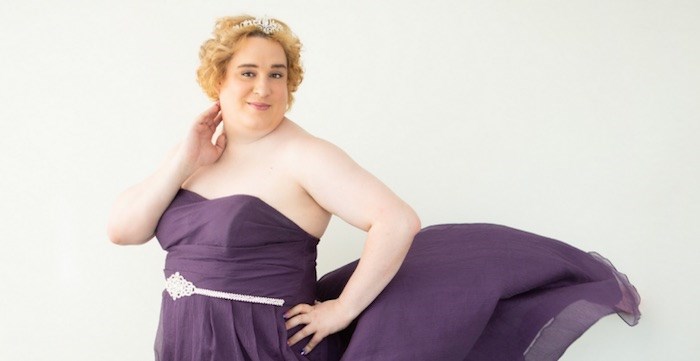 Jessica Yaniv. formerly known as Jonathan Yaniv, best known for having sparked international media attention for suing several local aestheticians at the B.C. Human Rights Tribunal after they allegedly refused to wax her genitals, which are those of an adult male. Yaniv is proposing a top-optional youth LGBTQ2S+ swim session in the Township of Langley. Photo via Jessica Yaniv (@trustednerd)/Twitter
Jessica Yaniv. formerly known as Jonathan Yaniv, best known for having sparked international media attention for suing several local aestheticians at the B.C. Human Rights Tribunal after they allegedly refused to wax her genitals, which are those of an adult male. Yaniv is proposing a top-optional youth LGBTQ2S+ swim session in the Township of Langley. Photo via Jessica Yaniv (@trustednerd)/Twitter
A Surrey transgender woman’s legal complaints against seven aestheticians who refused to wax her male genitals were both unjustified and improperly motivated by financial gain and racial discrimination on her own part, the B.C. Human Rights Tribunal has ruled.
Jessica Yaniv, a transgender woman whose tribunal hearing sparked recent international headlines, had her claims dismissed Tuesday. Furthermore, she’s been ordered to pay $6,000 for improper conduct.
Her initial order for $500,000 in costs was ruled to be “divorced from reality and reason.”
Yaniv had taken seven aestheticians to the tribunal after claiming they discriminated against her for refusing her service. A previous complaint by Yaniv against two other waxers had also been dismissed. The difference this time around was that tribunal member and adjudicator Devin Cousineau determined there was a pattern of discrimination by Yaniv herself.
“I find that Ms. Yaniv’s predominant motive in filing her waxing complaints is not to prevent or remedy alleged discrimination, but to target small businesses for personal financial gain. In many of these complaints, she is also motivated to punish racialized and immigrant women based on her perception that certain ethnic groups, namely South Asian and Asian communities, are ‘taking over’ and advancing an agenda hostile to the interests of LGBTQ+ people.”
Yaniv’s motives were hence not consistent with the B.C. Human Rights Code, said Cousineau in his ruling.
Cousineau noted how the tribunal rarely makes the determination of improper motives, which results in dismissal.
Her improper motives were determined because Yaniv used deception to manufacture some of the complaints, concluded Cousineau. She also sought to punish the respondents by filing numerous complaints. Yet she also stated a desire to resolve complaints for a financial settlement. Finally, she showed “animus toward certain racial, religious and cultural groups.”
Eight of the respondents Yaniv filed complaints against in both cases were non-white women, and typically working from home (two had to shut down because of the complaints, the tribunal heard).
“I found aspects of Ms. Yaniv’s testimony to be disingenuous and self‐serving. In cross‐examination, she was evasive and argumentative, and contradicted herself,” wrote Cousineau, noting Yaniv first claimed to have male genitals and then claimed later to be intersex with “other stuff.”
Yaniv claimed to have a vulva at one hearing, which Cousineau accepted as fact while denying a request from the respondents’ lawyers to have her undergo a medical examination. Nevertheless, Yaniv has a scrotum, Cousineau stated, and “there are differences between waxing the genitals of a person with a vulva and a person with a penis and scrotum.”
As such, refusal from the waxers could be justified if they did not have experience waxing male genitals.
“There is a material difference in waxing different types of genitals and that, because of its intimate nature, service providers must consent to provide service on a particular type of genitals,” wrote Cousineau.
Yaniv tried to argue that her being refused was like a gay person being refused a cake order (referring to a well-cited human rights case in the U.S.) on religious grounds.
“There is no material difference in a cake which is baked for a straight wedding, and one that is baked for a gay wedding,” wrote Cousineau. “Nor does baking a cake for a gay wedding require you to have intimate contact with the client.”
Yaniv was found to be deceitful. For instance, she asked one aesthetician how she would wax around a tampon string.
“She testified that the purpose of asking this question was to test Ms. Benipal’s ‘professionalism’ and to see if this was a ‘legitimate business.’ I do not accept that explanation,” stated Cousineau. “If Ms. Yaniv were genuinely curious about the legitimacy of Ms. Benipal’s business, she could have asked questions related to training, licencing, facilities or other matters relevant to the business.”
Cousineau acknowledged the case became a high-profile one, with Yaniv taking to social media daily to “battle her critics,” including defence lawyers Jay Cameron and Brandon Langhjelm from the Justice Centre for Constitutional Freedoms. Costs against JCCF were dismissed.
The case sparked international outrage and severe criticism of the tribunal for letting Yaniv’s complaints go so far.
Cousineau lowered the penalties against Yaniv after considering the “torrent of backlash and hatred” against her online following the exposure of her claim last summer.
Respondents included Blue Heaven Beauty Lounge and Sandeep Benipal; Sukhdip Hehar and Sukhi Dream Salon; Judy Tran; Marcia DaSilva; Hina Moin; Pam Dulay; and Merle Norman.


